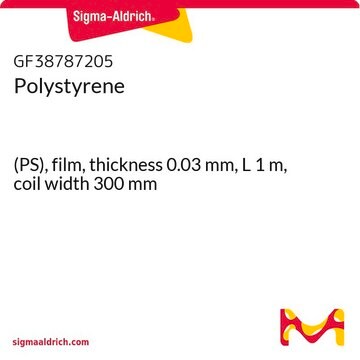All Photos(3)
About This Item
Linear Formula:
[CH2CH(C6H5)]n
CAS Number:
MDL number:
UNSPSC Code:
12162002
PubChem Substance ID:
NACRES:
NA.23
Recommended Products
form
beads or pellets
mol wt
average Mw 35,000
transition temp
softening point (ASTM E 28) 123-128 °C
density
1.06 g/mL at 25 °C
InChI
1S/C8H8/c1-2-8-6-4-3-5-7-8/h2-7H,1H2
InChI key
PPBRXRYQALVLMV-UHFFFAOYSA-N
Looking for similar products? Visit Product Comparison Guide
General description
Polystyrene is a high molecular weight synthetic polymer made from the polymerization of styrene. It is durable, thermoplastic, and hydrophobic in nature.
Application
Polystyrene(PS) can be used as a precursor to synthesize dye-doped fluorescent PS nanoparticles, which can be applied in the field of optical microscopy, cell tracking, and optical sensors.
It can be used to stabilize the perovskite component by forming PS-capped perovskite grains. This PS coverage can suppress the organic component evaporation, and water corrosion and promotes crystal self-healing of perovskite films.
Due to its optical clarity, low production cost, and ease ofmanufacture, it is widely used as a fundamental substrate for in vitrocell culture.
It can be used to stabilize the perovskite component by forming PS-capped perovskite grains. This PS coverage can suppress the organic component evaporation, and water corrosion and promotes crystal self-healing of perovskite films.
Due to its optical clarity, low production cost, and ease ofmanufacture, it is widely used as a fundamental substrate for in vitrocell culture.
Features and Benefits
- Thermal efficiency
- Durability
- Moisture resistance
Physical form
Bimodal.
Storage Class Code
11 - Combustible Solids
WGK
WGK 3
Flash Point(F)
Not applicable
Flash Point(C)
Not applicable
Personal Protective Equipment
dust mask type N95 (US), Eyeshields, Gloves
Certificates of Analysis (COA)
Search for Certificates of Analysis (COA) by entering the products Lot/Batch Number. Lot and Batch Numbers can be found on a product’s label following the words ‘Lot’ or ‘Batch’.
Already Own This Product?
Find documentation for the products that you have recently purchased in the Document Library.
Customers Also Viewed
Hiroyuki Yanagisawa et al.
Molecules (Basel, Switzerland), 23(4) (2018-03-23)
This study was conducted with the aim of achieving the simultaneous screening of various additives in polymer materials by utilizing a solvent-free pyrolyzer/thermal desorption gas chromatography mass spectrometry (Py/TD-GC-MS) method. As a first step to achieve this goal, simultaneous screening
Jelena Stanković et al.
Environmental pollution (Barking, Essex : 1987), 262, 114248-114248 (2020-03-15)
The effect of microplastics (MP) exposure on the chironomid species Chironomus riparius Meigen, 1804 was investigated using the OECD sediment and water toxicity test. Chironomid larvae were exposed to an environmentally relevant low microplastics concentration (LC), a high microplastics concentration
Laarnie Tumolva et al.
Microscopy research and technique, 75(4), 505-512 (2011-09-16)
Morphological properties of atmospheric particles are directly related to their residence time and transport behaviors, and their deposition patterns in human respiratory systems. The projected properties of particles measured by transmission electron microscopy (TEM) were combined with the particle height
Kevin Kendall et al.
Nanotechnology, 20(27), 275701-275701 (2009-06-18)
The weak molecular attractions of nanoparticles are important because they drive self-assembly mechanisms, allow processing in dispersions e.g. of pigments, catalysts or device structures, influence disease through the attraction of viruses to cells and also cause potential toxic effects through
Eunkyung Lee et al.
Bioresource technology, 101(5), 1487-1493 (2009-09-09)
In this study, membrane biofouling caused by bacteria that have different characteristics was evaluated using flow field-flow fractionation (FlFFF). Three different bacteria which differed from size and shape (Staphylococcus epidermidis, Escherichia coli, Flavobacterium lutescens) were investigated with GM ultrafiltration (UF
Our team of scientists has experience in all areas of research including Life Science, Material Science, Chemical Synthesis, Chromatography, Analytical and many others.
Contact Technical Service


